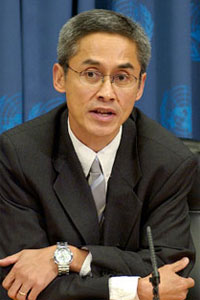
A timely issue raised by a recent forum of key businesses, political leaders and civil society was the potential for more inclusion of LGBTI (lesbian, gay, bisexual, transgender and intersex) people in the workplace. This is complementary to the other critically important issue of the day: the role of women in business and employment.
Extending that landscape to cover gender-diverse people is exemplary for a number of reasons. It implies compliance with human rights (for example, non-discrimination based on equal pay for work of equal value). It enhances corporate reputation with a more conducive atmosphere at work, exemplifying fairness and inclusion. It helps catalyse the business value chain, engendering productivity and adding to customer loyalty. It is a gateway for talent acquisition and retention, nurturing care and consideration for all employees and their families.
The forum mentioned Berli Jucker Company (BJC), which indicated that some 40% of its employees self-identify as LGBTI and welcomed their participation in an assessment. Companies in Thailand have begun to have inclusive policies and practices on this front, and the benefits conferred on employees include medical provision and liberal opportunity to take leave with other forms of social protection and support, not only for LGBTI people but also their partners.
Globally, the situation is not all rosy, however. There is still confusion concerning the difference between "sex" and "gender". While the former denotes a biological feature ("I was born male"), the latter is a social construct ("I affirm my gender is female, even though I was born male"). Gender also shifts from a binary approach of male and female to a more diverse self-identification which does not fit necessarily into the traditional box of duality.
Interestingly, the notion of "sexual orientation" ("How I am attracted to another person") is often misunderstood as implying only gay relationships, whereas, in reality, that orientation is an inherent feature of all humans -- homosexual or heterosexual. Meanwhile, the term "gender identity" is at the heart of how a person wishes to affirm the gender, without being bound by biological classification. It advocates recognition from others, especially the State, to enable change of identity documents, such as ID cards and passports, and to access medical and other facilities without discrimination.
Two other terms have emerged in recent years and they need to be better understood. "Gender expression" implies respect for a person's self-expression such as through dress, words and behaviour premised on the person's affirmed gender. Meanwhile "sex characteristics" is especially pertinent to intersex people who may have special biological features, at times both male and female, and is linked with the dilemma of forced surgery from a young age imposed on them.
There are other disconcerting developments to be tackled. Regrettably, about 60 countries still criminalise consensual same-sex relations. Anti-discrimination measures remain weak in many settings and where they exist. Many still do not recognise gender identity. The medical sector also needs to be activated to de-pathologise sexual orientation and gender identity (Sogi) and to avoid treating LGBTI people as cases for psycho-treatment, such as through "conversion therapy" to force people to change their Sogi.
As per universal guidance for the preferred pathway for business, there is the "UN Standard Code of Conduct for Business: Tackling Discrimination against Lesbian, Gay, Bi, Trans, & Intersex People" which underlines five standards: 1) Respect human rights; 2) Eliminate discrimination; 3) Provide support; 4) Prevent other human rights violations; and 5) Act in the public sphere.
The first standard requires company policy and commitment from the top level to promote non-discrimination and non-violence, with due diligence measures, monitoring, communication and remedies where there are discrepancies. The second standard invites measures to prevent discrimination in the process of recruitment, employment, work-related conditions, benefits and protection of privacy and against harassment.
The third and fourth elements entail a working environment that ensures the treatment of all persons with dignity and without stigma, interlinking with the supply and value chain, while the fifth is to work with the community at large to leverage respectful attitudes and actions towards gender diversity.
Increasingly, there are tools for assessing performance through the "Gender Index". One way to measure the record of companies, initiated by an NGO in the US, is the Corporate Equality Index. It is based on four criteria: 1) Workforce Protections; 2) Inclusive Benefits; 3) Supporting an Inclusive Culture; and 4) Corporate Social Responsibility.
There should be a policy and practice of equal opportunity for all employees. There should be parity of benefits for all spouses and partners, as well as access to medical and other provisions. Responsiveness and empathy need to be shaped through diversity training and education in-company, with good buy-in and examples from top management.
Thailand is now witnessing orientations along these lines, and these can be well expanded in future. The impetus is provided by the current government which has committed itself to gender diversity. There is already a Gender Equality Act which has helped to protect especially transgender people from discrimination, including about gender expression.
Innovatively, there is the draft new law on same-sex marriage. It aims to amend some 60 sections of the Thai Civil Code to change the former binary wording of "man and woman/husband and wife" to the more plural spectrum of "persons" and "spouses".
Other changes are in the works. There is an important draft law on gender to enable people to affirm their gender and to change the various documents concerning their identity accordingly. The latest version shuns the imposition of forced surgery on people if they wish to self-identify and affirm a gender that diverges from their biological sex.
Officialdom, NOTA BENE! Semantically in Thai, the word "sex" should be translated as "phet", while "gender" should be "phet sapap", please.
Professor Emeritus Vitit Muntarbhorn was formerly a UN Independent Expert on Sogi and is currently a UN Special Rapporteur under the UN Human Rights Council, Geneva.
